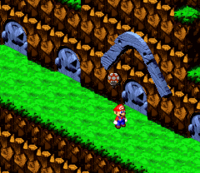Monstro Town: Difference between revisions
Boo Diddly (talk | contribs) |
Bro Hammer (talk | contribs) (→Trivia) |
||
| Line 16: | Line 16: | ||
==Trivia== | ==Trivia== | ||
*Coincidentally, the first sixteen seconds of the background music that's played in Monstro Town sounds like [[Count Bleck]]'s theme song from ''[[Super Paper Mario]]''. | *Coincidentally, the first sixteen seconds of the background music that's played in Monstro Town sounds like [[Count Bleck]]'s theme song from ''[[Super Paper Mario]]''. | ||
*Monstro is a pun on "monster", which originates from the majority of the inhabitants of the town. | *Monstro is a pun on "monster", which originates from the majority of the inhabitants of the town. It is also possible that it comes from the Portuguese word "''monstro''", meaning "monster". | ||
{{BoxTop}} | {{BoxTop}} | ||
Revision as of 07:13, April 27, 2014

Monstro Town is a cliff-side town in Super Mario RPG: Legend of the Seven Stars. It is accessible after successfully clearing Belome Temple. It is home to a mixed group of reformed monsters as well as a Toad woman by the name of Monstermama. Jinx, along with his student Jagger run the dojo, where they willingly accept challenges.
Of the notable monsters, there is a Chow who keeps track of the number of Super Jumps Mario has performed, and who will award prizes at 30 and 100 consecutive Super Jumps. There is also a Chester who tells Mario how many invisible chests are left to be found, and a Starslap who dances to a tune (which is the third song for Toadofsky at Melody Bay).
Also of notice is the visitor from Vanda; Culex, whom is often considered the hardest (albeit optional) boss in the game. Culex can be encountered by using a Shiny Stone (traded in Moleville for a Fireworks) on the sealed door.
Names in other languages
Template:SMRPGmap Template:Foreignname
Trivia
- Coincidentally, the first sixteen seconds of the background music that's played in Monstro Town sounds like Count Bleck's theme song from Super Paper Mario.
- Monstro is a pun on "monster", which originates from the majority of the inhabitants of the town. It is also possible that it comes from the Portuguese word "monstro", meaning "monster".